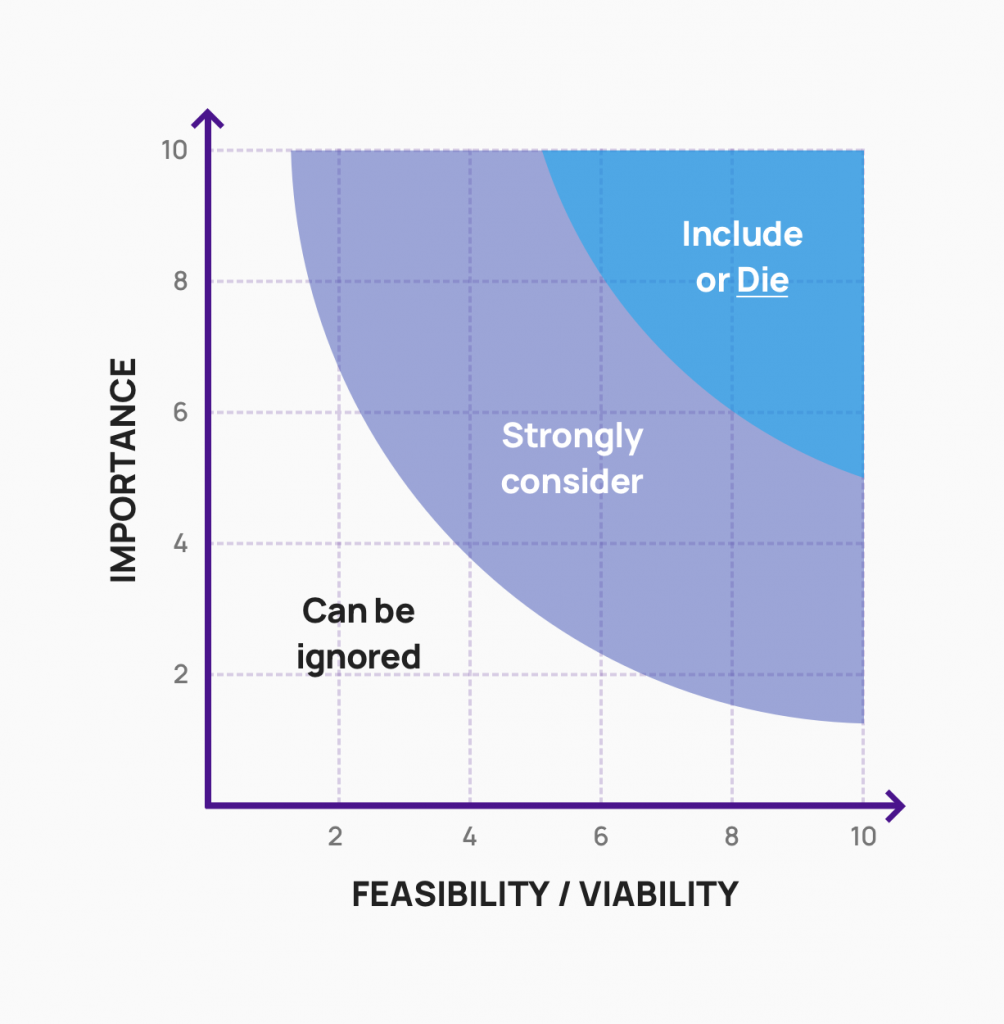While I do feel bad about tricking all of you into reading a guide written by an AI, I do feel proud about the results the experiment yielded. One of them is, that while holistic, the text generated by ChatGPT did not offer much helpful information for people seeking better methods for reaching their goals. Here’s the real guide, for real this time:
Set priorities by mapping out your goals
The first thing I believe is important for reaching a good habit of claiming goals is having many of them so you can assess their impact and simplicity. You see, goal-seeking is much more about the habit rather than the method. If you are struggling with things like weight loss, financial independence, reading, etc. try and pick a lower-hanging fruit to first get into the habit of getting that little rush when you strike something off your list.
A good tool for identifying such “easy” goals is the impact vs. feasibility matrix. Regardless of their impact, get used to the habit by picking some easy ones first.

Be generalistic
One of the most popular goal-seeking methodologies, especially what collaboration is concerned, are OKRs. Objectives and Key Results fosters collaboration by providing generalist objectives that become detailed at the individual execution. If your goal is to go running three times a week, you will not have achieved it by running twice. However, if your goal is to do more sports, every effort counts. More importantly, though, it opens the door for your goal to be scalable and progress further as you get better at achieving it.
Specify your progress
Paramount to the OKR method are key results that add a quantifiable layer to the meaning of success. When dealing with organizational OKRs, a good rule of thumb is to define soft KPI targets that are reachable, but not utopic… Basically, under 75% is underdelivered, and 100% is not ambitious enough, with the sweet spot somewhere in the remaining 25%. Keep in mind, this is in the context of collaboration, and using OKRs in their fully developed form is serious over-engineering in the personal context, but it does yield good methods for motivation. Remember, you’re trying to do more sports and, while going for a short 15-minute jog is progress, going for two half-hour runs is something that you can strive to achieve.
Tell the world about it
This is a polarizing philosophy. On the topic of “do good and tell the world about it”, I know more people who are reserved about their progress than ones that brag arrogantly about it. And out of all the guidelines and suggestions I am sharing here, this is one that is a) not essential for reaching your goals and b) very individual.
The healthy variant lies somewhere in between keeping it to yourself and arrogantly comparing your “ego” with others. Getting Kudos on my Strava activity or showing my kids that I learned to play a new song on the piano are things that trigger my motivation to do more, all the while being sensitive to the fact that I shouldn’t be showing off… It’s just not polite.
Seek help
Let’s be clear: there is as good as zero benefit in being stubborn and doing stuff alone. One could argue that going at it alone brings an additional sense of fulfillment, but the goal of this exercise is to be more successful in goal-seeking, not proving that you are independently successful at goal-seeking. Other people might have insights, give you a tap on the shoulder, or simply have done the same exercise before, sparing you the effort of finding solutions when your progress stagnates.
Treat goal-seeking like an absolute
This is the punch-line. Don’t limit yourself by thinking that your professional or personal goals carry different priorities. Goal-seeking is a healthy exercise that leads to the absolute improvement of your life, be it successfully seeking that promotion or becoming a long-distance runner. The impact vs feasibility matrix is best served by having all your ambitions in one place. Remember: goal-seeking is much more about the habit of doing it frequently and the fulfillment of being successful and less about the goals themselves, them becoming a by-product of the methodical thinking used to achieve them.
![Karsten Baumgartl [dot] com](http://beta.karstenbaumgartl.com/wp-content/uploads/2022/12/IMG_20170409_190434_inverted.png)

